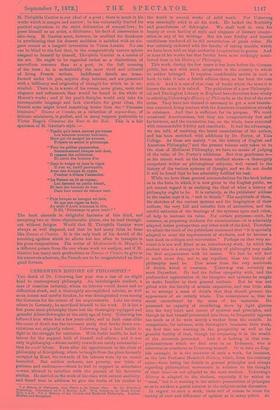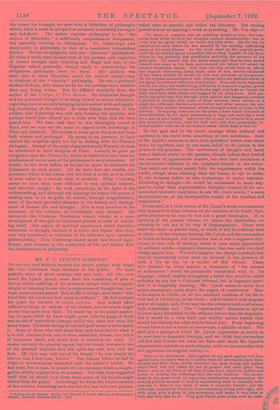UEBERWEG'S HISTORY OF PHILOSOPHY.*
THE death of Dr. Ueberweg last year was a loss of no slight kind to contemporary philosophy. An indefatigable student, a man of ceaseless industry, whom no labours would daunt and no difficulties abash, and a thoroughly accomplished scholar, as well as an honest and careful thinker, he was distinguished even among the Germans for the extent of his acquirements. Like too many others in Germany, he sacrificed himself to his work. It is but a few years since philosophy there lost the thoroughly-equipped and graceful Albert Schwegler at the early age of forty. Ueberweg has followed him when but a few years older, and in both cases alike the cause of death was the incessant study that broke down con- stitutions not originally robust. Ueberweg had a hard battle to fight in the struggle for existence. With feeble health, he had to labour for the support both of himself and others ; and it was only in philosophy—whose earthly rewards are rarely substantial—. that he could labour. Even after his appointment to the chair of philosophy at Konigsberg, where he taught from the place formerly occupied by Kant, the rewards of his labours were by no means bountiful. But neither sickness, nor poverty, nor trials of patience and endurance—which he had to support in abundance —were allowed to interfere with the pursuit of his favourite studies. He carried 'on the work of his class with earnest assiduity, and found time in addition to give the fruits of his studies to • A History of Philosophy, from Males to the Present Time. By Dr. Friedrich treberweg. Translated by 0. S. Morris, A.M. With Additions by Noah Porter, D.D., LL.D. Vol. 1. History of the Ancient and Medizeval Philosophy. London: Hodder and Stoughton. the world in several works of solid merit. For Ueberweg was essentially solid in all his work. He lacked the flexibility and gracefulness of Schwegler. We shall look in vain for beauty or even facility of style and elegance of literary compo- sition in any of his writings. But his rare fidelity and honest carefulness rendered all he did nevertheless of great value. He was certainly endowed with the faculty of taking trouble, which we have been told on high authority is equivalent to genius. And in none of his works has that faculty been mare strikingly mani- fested than in his History of Philosophy.
This work, daring the few years it has been before the German public, has met with much acceptance in the country to which its author belonged. It requires considerable merits in such a book to take it into a fourth edition there, as has been the case with it. And it is one of that class of books which the more it its known the more it is valued. The publishers of a new Philosophi- cal and Theological Library in England have therefore done wisely in selecting Ueberweg's History of Philosophy as the first of the new series. They have not deemed it necessary to get a new transla- tion executed, being content with the American translation already in existence. And that is sufficient for its purpose. We meet occasional Americanisms, but they are comparatively few and far between, and the translation has, on the whole, been executed with commendable filelity and exactitude. It had the advantage, we are told, of receiving the latest emendations of the author, and has been enriched with additions by Dr. Porter, of Yale College. As these are mainly "on the history of English and American Philosophy," and the present volume only takes us to the close of Mediteval Philosophy, we have no means of judging of the value of Dr. Porter's additions. But that gentleman h- as his recent work on the human intellect shows—a thoroughly competent writer on philosophical subjects, well versed in the history of the various systems of thought, and we do not doubt it will be found that he has admirably fulfilled his task.
While we have these general commendations for the book before us in the form in which it is now given to the English public, we yet cannot regard it as realising the ideal of what a history of philosophy ought to be. It is certainly, as the publishers' address to the reader says it is, "rich in details." The amplitude of these, the sketches of the various systems and the biographies of their authors, the very full and valuable lists of authorities, and the careful eatimates of the bearings of the systems upon each other, all help to increase its value. For certain purposes—such, for instance, as preparing students for examinations—it is admirably adapted, better perhaps than any other work of the kind. Therefore we admit the truth of the publishers' statement that "it is specially adapted to meet the requirements of students, and to become a text-book in colleges and universities." Perhaps on that very ac- count it is not well-fitted as an introductory work, by which the student who is a stranger to the history of philosophy may make his first acquaintance with its coarse. We fear he will find it much more dry, not to say repellent, than the history of philosophy need be. This arises from the very multitude of details which it contains. Ueberweg was certainly no mere Dryasdust. He had the fullest sympathy with, and the profoundest appreciation of, the thoughts and systems he sought to make familiar in their general outlines. But he was not gifted with the faculty of artistic exposition, and was little able so to arrange a mass of details that they should present the appearance of an orderly whole. The consequence is, that he seems encumbered by the mass of his materials. He possessed no capacity of elucidating these by light glances into the very heart and centre of systems and principles, and though he had himself penetrated into them, be frequently appears too much as if he were merely a worker from the outside. In comparison, for instance, with Schwegler's luminous little work, we find this one wanting in the perspicuity as well as the graceful facility of that, though far surpassing it in the wealth
of the materials presented. And it is lacking in that com- prehensiveness which we find even in an Erdmann, who is otherwise as cumbrous as Ueberweg himself. Or to take an Eng-
lish example, it is the converse of such a work, for instance, as the late Professor Maurice's History, which, from the contrary
cause—from fusing the details in general principles and always regarding philosophical movements in relation to the thought of their time—is not adapted to the mere student. Ueberweg's
History is adapted to the student, especially if he wishes to "cram," but it is wanting in the artistic presentation of principles so as to awaken a genial interest in the subjects under discussion.
In regard to such a work, there will of course be room for variety of view and difference of opinion as to many points. At the outset, for example, we meet with a definition of philosophy which, while it must be accepted as accurate, is certainly too vague and indefinite. The author explains philosophy to be "the science of principles," a sufficiently comprehensive designution, but assuredly wanting in definiteness. Dr. Ueberweg's own stand-point in philosophy is that of a competent independent thinker. He has no sympathy with the " Absolute " philosophers. He takes a much more modest view of the powers and capacities of human thought than Schelling and Hegel and men of the Hegelian school generally, though ready to acknowledge the
obligations philosophy owes to them. His position was more akin to what Hamilton called the natural realist's than to thinkers of the " identity " philosophy. He was a profound student of Kant, with whose works he was perhaps more familiar than any living writer. But he differed decidedly from the author of the Critique of Pure Reason. He vindicated thought and the powers of thought from being viewed as merely subjective, regarding them as actually bringing us into contact with and supply- ing knowledge of the reality. In some things, however, it was evident that Ueberweg was still only forming his opinions, and perhaps would have altered not a little with time, had life been spared him. We have said that he was thoroughly versed in Kant, and we may say the same in regard to his knowledge of Plato and Aristotle. His studies in these great thinkers had been both minute and prolonged. He seems to us, however, to have carried the sceptical spirit too far in dealing with the Platonic dialogues. Several of the most characteristically Platonic of them he attributed to later disciples of Plato. Latterly he gave up altogether even the Partnenides, which he believed to have been the production of one or more of the philosopher's early successors. Of course, in the work before us be has no space to vindicate his judgments on such points. All we have here are results, not processes, which is one reason why the book is so dry as it is, while of such value to a certain class of students. What Ueberweg seems to have been most deficient in was spiritual instinct, and therefore insight. Ile read everything by the light of the understanding, and although not claiming for reason the power of making men to be as gods, he missed, through inappreciation, some of the most powerful elements in the history and develop- ment of human life and thought. This is very manifest in his treatment of the influence of Christianity upon thought. He interprets the Christian Revelation almost wholly as a mere development of thought in its natural process or order of unfold- ing itself. The region of spiritual experiences which furnishes nutriment to thought, because it is wider and higher than that, was only considered in reference to its influence upon conscious philosophising. Thus Ueberweg missed much that was of signi- ficance and moment in the connection of life and history with the developments of philosophy.



































 Previous page
Previous page